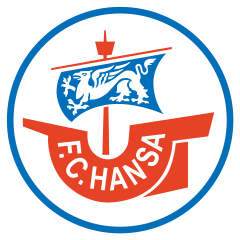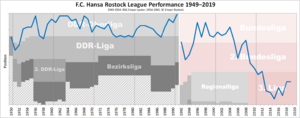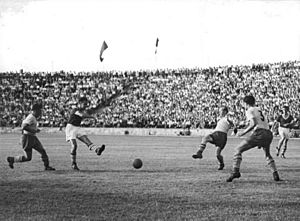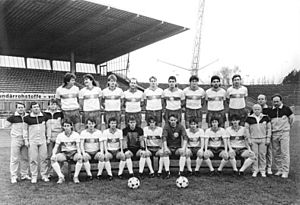FC Hansa Rostock facts for kids
 |
||||
| Full name | Fußballclub Hansa Rostock e. V. | |||
|---|---|---|---|---|
| Nickname(s) | Hansa, Hanseaten, Kogge, Hansa-Kogge, Ostseestädter |
|||
| Founded | 28 December 1965 | |||
| Ground | Ostseestadion, Rostock | |||
| Capacity | 29,000 | |||
| Chairman | Robert Marien | |||
| Manager | Daniel Brinkmann | |||
| League | 2. Bundesliga | |||
| 2020–21 | 3. Liga, 2nd of 20 (promoted) | |||
|
||||
FC Hansa Rostock is a German football club from the city of Rostock. Rostock is located in Mecklenburg-Vorpommern, a state in northeastern Germany. The club is often called "the cog" because its logo features a type of ship called a cog. This ship was used by the Hanseatic League, a group of trading cities in the Middle Ages.
Hansa Rostock is known as one of the most successful clubs from what used to be East Germany. After Germany became one country again, Hansa Rostock played many seasons in the top German league, the Bundesliga. With over 29,000 members, it is one of the biggest sports clubs in Germany.
The club played in the Bundesliga for ten years, from 1995 to 2005. After that, they faced some tough times. In 2012, they were moved down to the 3. Liga for the second time. They managed to get back into the 2. Bundesliga in 2021. However, after three seasons, they were moved back to the 3. Liga in 2024.
Contents
Club History
The club started on November 1, 1954, as a bigger sports club called SC Empor Rostock. The football team, however, was not made up of local players. Instead, the football team from BSG Empor Lauter, a club from a town called Lauter, Saxony, was moved to Rostock. This move happened even though the fans in Lauter were not happy about it.
In the 1950s, it was common for football clubs in East Germany to be renamed or moved by government officials. The new club in Rostock was supported by a large fishing company.
Playing in Rostock
SC Empor Rostock took the place of the Lauter club in the top league in November 1954. They finished second in their first full season. In 1956, they were moved down a league, but they quickly returned to the top league in 1958. They became a strong team, finishing second three times between 1962 and 1964. They also reached the final of the FDGB Pokal, which was the East German Cup.
In 1965, the football part of the club became its own separate club, called Fußball Club Hansa Rostock. This new club was chosen as one of the top 10 football clubs in East Germany. Their goal was to train talented players for the national team. The name "Hansa" honored Rostock's history as a major trading city in the Hanseatic League.
During the 1970s, Hansa Rostock often finished in the lower half of the league. They were moved down to the second division three times. But they improved in the 1980s. When the football leagues of West and East Germany joined together in 1990, Hansa Rostock won its first national championship. This happened in the last season of East German football, called the NOFV-Oberliga. This is their only top-league title in either East Germany or the united Germany.
They also won the last East German Cup in 1991, beating FC Stahl Eisenhüttenstadt 1–0.
United Germany and the Bundesliga
Because of their success, Hansa Rostock earned a spot in the Bundesliga for the 1991–92 season. The Bundesliga was briefly made bigger to include two teams from former East Germany. However, Hansa Rostock was moved down after just one season.
After three seasons in the 2. Bundesliga, they returned to the top league for the 1995–96 season. They stayed in the Bundesliga for ten years. Their best results were finishing sixth twice. Even though they often finished in the bottom half of the league, they were the only former East German team that could regularly compete with the richer clubs from West Germany.
In 2005, Hansa Rostock was moved down from the Bundesliga. This meant that for the first time since Germany reunited, there was no former East German club in the top league. Many talented players from East German teams were bought by wealthier western clubs.
After two years in the 2. Bundesliga, Hansa Rostock returned to the top league for the 2007–08 season, but they were moved down again. In 2010, they finished near the bottom and had to play a special playoff game. They lost both games and were moved down to the 3. Liga. They returned to the 2. Bundesliga in 2011, but were moved down again in 2012.
Hansa Rostock has a strong fan base. In the 2016–17 season, they had an average of 11,433 fans at their home games, which was the third-highest in the 3. Liga.
Club Achievements
After Germany reunited, Hansa Rostock became the last champion of East Germany in the 1991 NOFV-Oberliga season.
National Titles
- NOFV-Oberliga
- Champions: 1991
- DDR-Oberliga (East German Top League)
- Second Place: 1955, 1962, 1963, 1964, 1968
- FDGB-Pokal (East German Cup)
- Winners: 1991
- Second Place: 1955, 1957, 1960, 1967, 1987
- 2. Bundesliga (German Second League)
- Champions: 1995
- 3. Liga (German Third League)
- Second Place: 2021
Regional Titles
- Mecklenburg-Vorpommern Cup
- Winners: 1998, 2005, 2006, 2011, 2015, 2016, 2017, 2018, 2019, 2020, 2025
Youth Titles
- German Under 19 championship
- Winner: 2010
- Second Place: 2013
- German Under 17 championship
- Second Place: 2005
Other Titles
- German Indoor championship
- Winners: 1998
Double Wins
Hansa Rostock won both the DDR-Oberliga and the FDGB-Pokal in 1991.
Current Players
First Team Squad
|
|
Coaching Staff
| Position | Name |
|---|---|
| Manager | |
| Assistant manager | |
| Goalkeeper coach | |
| Fitness coach |
The Stadium
The home stadium for Hansa Rostock is the Ostseestadion. It was first built in 1954, with many local people helping out for free. In 2001, the stadium was updated and can now hold 29,000 fans.
Images for kids
See also
 In Spanish: FC Hansa Rostock para niños
In Spanish: FC Hansa Rostock para niños
- List of FC Hansa Rostock players
- List of FC Hansa Rostock records and statistics





